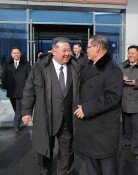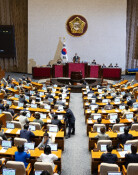[Opinion] Gifts From Public CEOs to Unions
[Opinion] Gifts From Public CEOs to Unions
Posted January. 01, 2009 07:03,
Choo Kang-soo, head of the Korea Gas Corp., says he was asked by the companys union for new gifts from the CEO following his appointment in October last year. In a New Years briefing by state-run organizations to President Lee Myung-bak this week, Choo said, I heard that since you became president, you must present gifts to employees. It is a tradition. Choo managed to hold dialogue with labor, which had opposed his appointment and labeled him a puppet of President Lee. The CEO said he was threatened after rejecting the request. Yet how many other shameful public CEOs have compromised their ethics and complied with such a dirty request?
If President Lee was surprised to hear Choos story, that would be more alarming given that the practice is prevalent at public organizations. The alleged gift request has existed for more than 10 years and remains at certain agencies. The head of the Korea Power Engineering made a secret deal with the companys union, which opposed him taking office. After extra pay did not come due to objection by the board of trustees, however, the union staged a sit-in strike at the CEOs office. The executive ended up illegally paying 5.4 billion won (4.5 million U.S. dollars) to 1,700 employees without getting board approval in January the following year. This was the first case of its kind caught by the Board of Audit and Inspection, and was exposed only after the incident sparked a labor dispute. If the scandal of CEO post for perks was not found as similar cases were in other state-run companies, the incident might have remained hidden.
The dirty practice stems from collusion between unions and public sector CEOs. Unions welcome new presidents who seek to protect their interests or seek secret deals with candidates that unions do not approve of. This happens regardless of whether a company head is politically appointed or not. Last year, former Grand National Party lawmakers Chung Hyung-keun, Kim Gwang-won, Hong Moon-pyo and Jeon Yong-hak were named to head state-run companies. The unions of the public companies in question downplayed the political appointments, but an umbrella union blasted the appointments as selfishness by unions. Unions, however, also staged protests to prevent new heads from taking over for certain periods of time at several other companies.
If a union welcomes a new CEO, the implicit request is that he or she should ensure that no mergers or corporate restructuring are forthcoming. If a new CEO is greeted with a union protest, the message is that he or she must improve employee welfare like his or her predecessors. In any case, quite a lot of money is needed for a new public company head to ensure a soft landing. Do taxpayers have to pay extra for public sector CEOs appointed through political favoritism by the incumbent administration, which took power by strongly pledging government reform? The people, which have long suffered from corruption and irregularities at state-run companies, would like to ask the government a question: why cannot you fix the same chronic problem?
Editorial Writer Hong Kwon-hee (konihong@donga.com)







